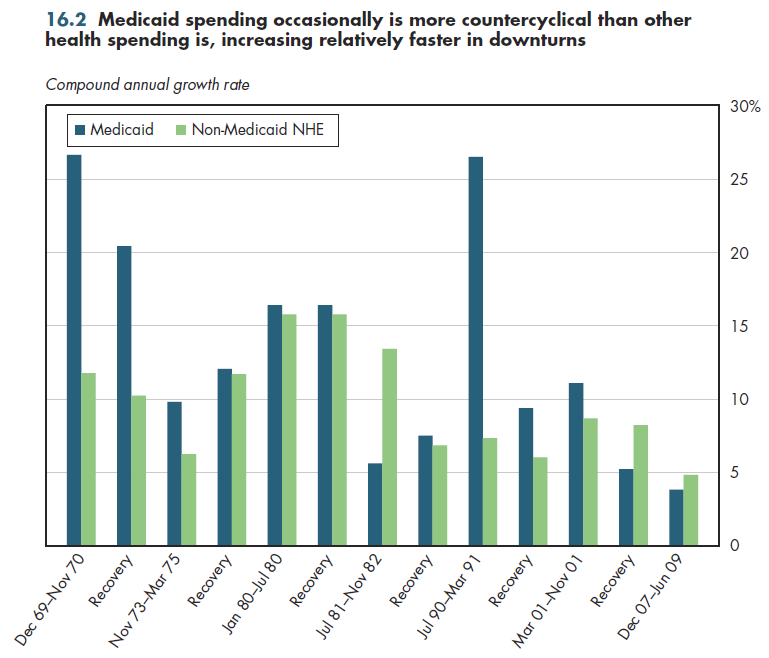Download PowerPoint versions of figure.
Inside Collection (Book): American Health Economy Illustrated
16.2 Medicaid Spending Tends to Be More Countercyclincal among Components of NHE
Summary: Medicaid expenditures tend to be more countercyclical than are other components of NHE, generally rising faster during recessions than during recoveries.
When health spending is separated into Medicaid and "everything else," a slightly more cyclical pattern emerges (figure 16.2). In some recessions—notably those during the late 1960s and early 1990s, growth in Medicaid spending has far outpaced spending for other health care services. The size of this growth differential was much larger during the downturn than in the period either before or after. Other social welfare spending, certainly unemployment benefits, but also Food Stamps and other forms of cash or in-kind assistance, tend to be more cyclical than Medicaid is.

Some of the program's tendency to serve a countercyclical function has been masked by some large changes in Medicaid policy that had the effect of escalating Medicaid spending during years of economic growth rather than during downturns. Arguably, the political will to enact such Medicaid expansions was greater during times of relative "plenty." For example, starting in the mid-1980s, a series of expansions over many years targeted children, pregnant women, and infants. Likewise, enactment of SCHIP in 1997 to expand further the coverage of children occurred during a period of rapid economic expansion. This had the effect of exaggerating Medicaid's relative rate of growth (compared with all other health spending) during the 1990s and thereby making it appear larger than the growth differential that occurred during the 2001 economic slowdown.
Downloads
References
- Author's calculations.
- Department of Health and Human Services. Centers for Medicare and Medicaid Services.
Collection Navigation
- « Previous module in collection 16.1 Aggregate Health Spending Growth and Business Cycle Fluctuations
- Collection home: American Health Economy Illustrated
- Next module in collection » 16.3 Unemployment Rates for Male Workers in the Health Sector Are Lower than the Rest of the Economy
Content actions
Give feedback:
Download:
Add:
Reuse / Edit:
Twin Cities Campus:
- © 2012 Regents of the University of Minnesota. All rights reserved.
- The University of Minnesota is an equal opportunity educator and employer. Privacy
- Last modified on Sep 25, 2013 2:15 pm -0500









